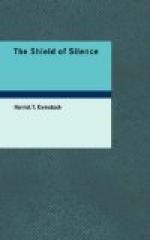It took but a twist to change a private incident into a blurred but amazing suggestion.
Mrs. Tweksbury was frankly and angrily impressed.
When passing from the room Miss Gordon spoke to her:
“Do you believe in my Veiled Lady?” she asked.
“Certainly not, Miss Gordon, but I’m—afraid of her! You had better guard her somewhat—or she’ll be taken seriously.”
“We’ll never see her again!” prophesied Joan, chuckling over her victory with the old lady; “I’ve evened up for Nan and me!” she thought, and then the incident passed from her mind.
But not so easily did the matter go from the confused thoughts of Mrs. Tweksbury.
“I dare say,” she finally concluded, “that if one could tear the veil from the face of that impudent little minx one would discover the smartest of the objectionable Smart Set. The girl should be curbed—how dare she!”—here Emily Tweksbury flushed a rich mahogany red as she recalled some of the cleverly concealed details of, what seemed to her, the most private affairs.
“Outrageous!” she snorted, and vowed that she deserved all that she had received for supporting the new-fangled nonsense that was spreading like a new social evil in the heart of all she held sacred.
Patricia Leigh had not been so interested in years as she was in Joan’s affairs at the Brier Bush. They smacked of high adventure and thrilled the girl.
To Sylvia they were rather grovelling means to a legitimate end. She scowled at Joan’s vivid description of her experiences and warned her to trust not too fully to her veil.
“But it’s a splendid lark!” Patricia burst in, defensively; “it’s Art spelled in capitals. Joan, take my advice and get points about the swells and scare them stiff!”
“Pat, you should be ashamed!” Sylvia scowled darkly.
“Yes?” purred Patricia. Then: “I see the finish of Plain John’s romance, my sinister Syl, if you don’t limber up your spine. Genius, love, and unbending virtue never pull together.”
And then—it was when March was dreariest and drippiest—Kenneth Raymond strode—that was the only word to describe his long-legged advance—into the Brier Bush for luncheon with Mrs. Tweksbury.
He had listened to variations of Mrs. Tweksbury’s first visit to the tea room with varying degrees of impatience.
He hated tea rooms; he had little interest in young women, and particularly disapproved of the type bordering on license; but he had consented to go in order to lay the old lady’s growing nervousness concerning the details of her first visit.
“My dear,” Mrs. Tweksbury had said to Raymond, “the more I think of it the more I am puzzled.”
“Exactly,” Raymond replied; “the more you think of it the more puzzles you introduce. Undoubtedly the young woman is a girl playing outside her legitimate preserves. She’s taking an unfair advantage. They always do. Presuming on sex and social position. Unless the girl is an outlaw, she’ll confine her antics to the safe outer edge.”




